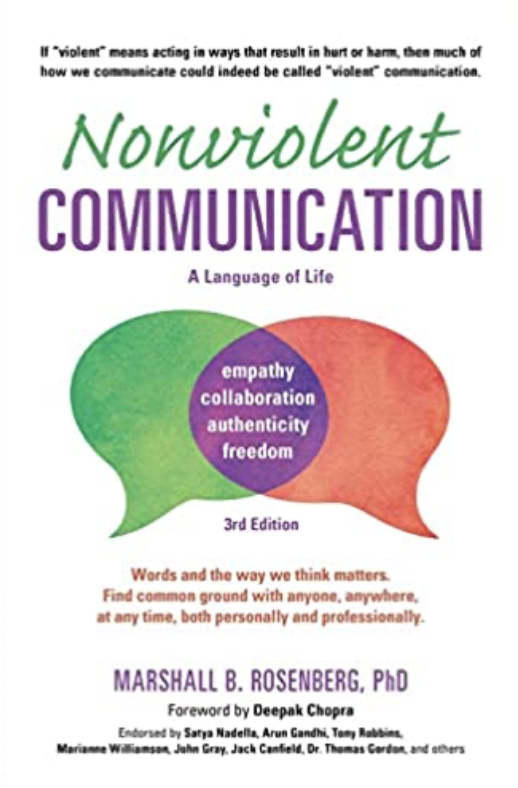
Book Review: 'Nonviolent Communication'

Out beyond ideas of wrongdoing and rightdoing, there is a field. I will meet you there. —Rumi
What do you want from a communication with others? Information, solution, recognition, understanding, empathy? No matter what we want, we have to admit that, behind every conversation, there are needs to be fulfilled for both sides. However, often times people would unconsciously digress to argue the wrongness and rightness of each other, instead of focusing on expressing and meeting mutual needs, so no one ends up being satisfied. It’s no surprising that we have fruitless exchanges and don’t get what we want because we have never been taught to get what we want. Instead, we’ve been trained to look outside ourselves for the definition of what constitutes right, wrong, good, and bad and to be good. That’s the gap the book nonviolent communication (NVC) is trying to fill. NVC trained us to observe and specify behaviors that are affecting us, as well as learn to identify and clearly articulate what we are concretely wanting in any given situation, so that relationships can be established based on honesty and empathy that will eventually fulfill everyone’s needs.
When I was reading the book, I recalled the dialogues I had with family, friends and coworkers in the past. It struck me that I rarely articulated directly what I need at those moments. I was doing all the blaming games and intellectual analysis, but how come I couldn’t just say what I want? Well, sometimes it’s probably because I don’t know what I want, I was relying on others to detect it. If I were lucky, other people might be willing to spend time figuring out my needs, but above all, I am responsible for my intentions and actions. Sometimes it’s because I am self-conscious to make a request for my needs due to hierarchical or social norm concerns. However, as the book pointed out “If we don’t value our needs, other may not either”. Nonetheless, the most prominent reason is that I lack “needs literacy”, I don’t know what’s the appropriate way to communicate my needs so that I can have my need not sound like a demand and well-accepted. In which respect, NVC teaches us to use the process language consisting of four components – observation, feeling, need, request – to express ours and hear others needs, more details are explained in the book. Meanwhile, the “needs literacy” reminds me an video I watched the other day. It’s an interview of a Chinese writer Cai, Chongda (Video in Chinese), he said “That people feel lonely is because they don’t understand themselves, neither do they know how to express it. The mission of writers is to explore the fundamental topics inside our heart and express it. Once expressed, it will replace others to accompany us.” I feel the interview excerpt delivered the same message as the NVC that accurate literacy is a critical tool to accomplish our needs.
The other concept I echo a lot with NVC is empathy. By the NVC standard, giving empathy to others means emptying our mind and listening with our whole being, being present and asking before offering advice or reassurance. Often times people are too quick to jump into response and advice, without giving enough space for others to fully express themselves. Giving empathy to ourselves means understanding the unmet needs behind self-judgement. Empathizing with ourselves is essential because we need empathy before giving it to others.
In a communication, our needs cannot be accomplished at the expense of others’ needs. Not only do we use the NVC language to express and fulfill our needs, but also implementing the same process to understand other parties’ needs. No matter what message is delivered, it could be silence, attack or rejection, listen to what people are needing rather than what they are thinking. Behind intimidating messages are merely people appealing to us to meet their needs. Finally, I would like to conclude the blog with a sentence repeatedly emphasized in the book, “If we express our needs, we have a better chance of getting them met”.
